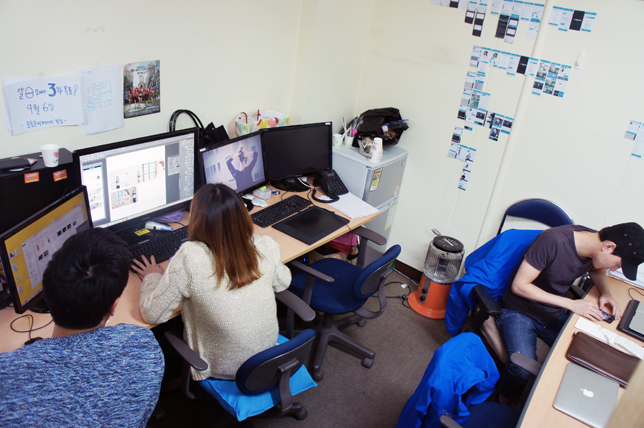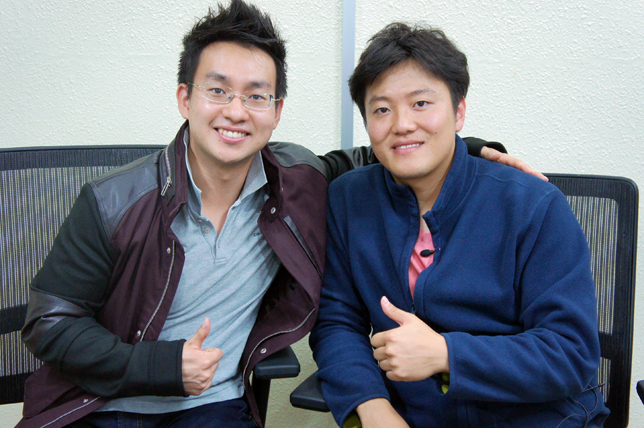
Startup Nomad 2013 is a three month long global accelerator program organized by The Ministry of Science, ICT and Future Planning and The National IT Industry Promotion Agency, and hosted by VentureSquare in collaboration with Plug&Play.
The Startup Nomad teams plan to leave in early November for Silicon Valley to participate in an acceleration program at Plug&Play Tech Center. Each team will undergo intensive mentoring and coaching to equip them with the tools to enter the global market. There will also be an opportunity to showcase the startup to local investors in the USA, and upon return to Korea, a Demo Day will be held on Dec 11th.
VentureSquare has taken this opportunity to hear about the global strategy and the expectations of each team waiting aboard on ‘Startup Nomad’ global accelerator program in Silicon Valley.
Design Your Life (DYL) has a vision that many more people live healthy life through their mobile application, Design Your Body. Users can enjoy a variety of video clips including fitness, pilates, and home training on Design Your Body (DYB). DYB put more effort in providing optimized solutions for each customer, focusing on design, pleasure, and health. VentureSquare has met Jongsoo Moon and Albert Ahn from DYL to hear about what their goals are for the Startup Nomad program.
It is known that Design Your Life has started as one of the student startups at Yonsei university. What kinds of trouble did you face on the way as a student startup team?
Mr. Moon: All of the team got together in 2011. We wandered around cafes and restaurants since we didn’t have financial support and a work space. Fortunately we got accepted by Yonsei University Venture Center. It has been 2 years, and I still can’t believe that we got the chance.

Lots of things have happened so far. Albert went to UC Berkeley for a year as an exchange student. As for the team, several people got in and out due to personal matters. Frequent changes of team members have delayed us to move forward. Now the team member lineup has been secured. I believe that now we have a team with great loyalty. It seems like we hit the turning point from a college social club to a real startup company.
You’re supposed to spend 5 weeks in Silicon Valley, tell us what your strategy is during the program in the U.S.
Mr. Moon: We’re sending out offers to the renowned fitness trainers in the states for potential partnership and getting positive responses from several trainers. Every single of the trainers is a rock star on social media sites such as Facebook or Youtube. They already have produced lots of content and also want to make more with us.
Albert: We already have been talking to a few local trainers through Skype. For the 5 weeks, we’re planning to make actual video content with those trainers. We’re trying to do something more tangible than just networking with local trainers. So, we’re looking at the calendars and matching up the schedule to shoot videos with the trainers.
Mr. Moon: We have the experience of creating more than 1000 pieces of content. We didn’t outsource movie making and editing parts. When we put our hands on these works, people said that it’s waste of time and it better be outsourced. My team started from scratch because we lack everything. Now the designers in my team are versatile covering A to Z in movie making. We could make things happen from this hard training.
(‘Don’t be this guy at the gym.’ A video clip recommended by CTO, Albert. Funny scenes which often happen at gym.)
To my knowledge, Albert as a citizen of U.S. has experienced startup culture in both Korea and the States. What’s the difference between the two of them?
Albert: I have had a chance to study at UC Berkeley in an exchange program. Almost every single week, hackathon-like events took place. I could join a diversity of incubating programs. I met Jesse Krieger, the author of ‘Lifestyle Entrepreneur’ and the CFO of UC Berkeley at University Incubator, the incubating program of UC Berkeley. It was impressive that I had the opportunity to chat with them over coffee and got advice on various issues.
Also, UC Berkeley provides the students with 3 thousand dollars to support the students’ business idea. The students who get funded with the seed money at least can proceed to prototyping. In Korea, we don’t have many of these opportunities to learn by doing.
Mr. Moon: Albert’s story impressed me a lot. I thought this would be great time to start business in Korea. Unlike me, Albert had difficulty joining incubating programs in Korea. The overall startup environment is neither friendly nor inclusive to foreigners.
The number of incubating programs and events doesn’t matter. Albert, who is accustomed to Korean culture, rather benefited from the U.S. startup environment. This means our startup environment is not wide-open to foreigners. When people say ‘go global’ in Korea, it always means we go outside, not that we attract people from the world inside.
DYB has been incubated in the Yonsei University Startup Venture Center. Can you share your good or bad experiences of being supported from the university incubating center?
Mr. Moon: It wasn’t a bad experience. I’m really thankful to the incubating center. There are several cases in which the incubated teams made successful businesses and got offices outside the center. My team is slow on growth and has been sitting here longer than expected. Every six months, the center hosts a presentation competition to explore the competent startups for the working space. The winners in the competition stay. My team has gone through 4 competitions and survived. I would like to grow faster and get out of the center to stand on our own feet. In the long run, I would like to help other startup peers in the center and give them back on what I’ve been given from the incubating center.
There are lots of opportunities to mingle with other competent teams. Sometimes you can get help from them and have a chance to cooperate with them. Staying in the center means you have more access to good resources and like-minded friends.
Would you let us know what’s your next move?

Mr. Moon: Securing quality content is our top priority. To enhance the reliability of our content, we’re trying to get the sports medicine lab of Yonsei University involved in our business. We’re not only targeting training view clips, but also we’re planning to expand our service to a medicinal application. So, we can offer our customers an overall solution on a healthy life. We’re building our brand on a total health care solution.
You must be logged in to post a comment.